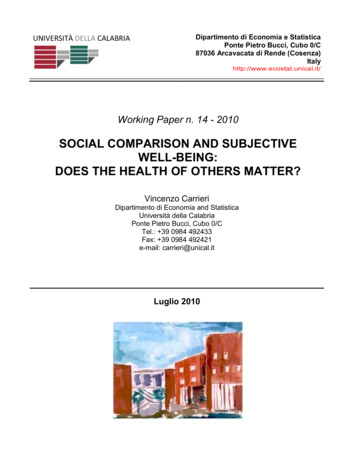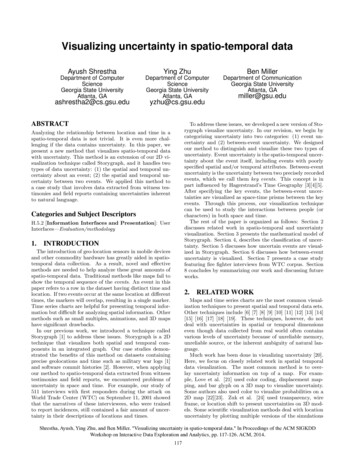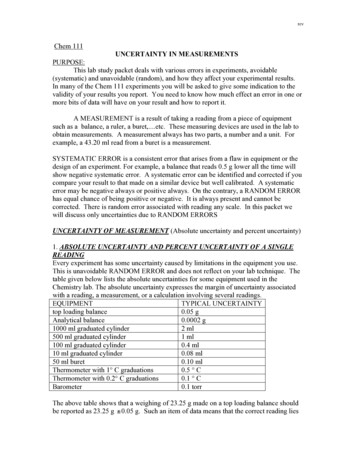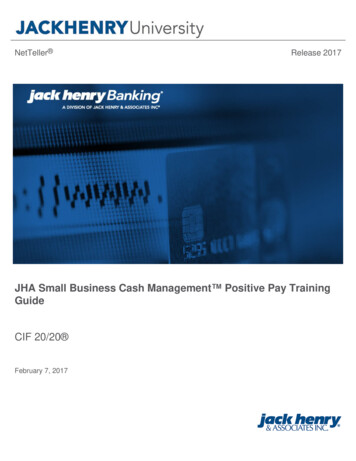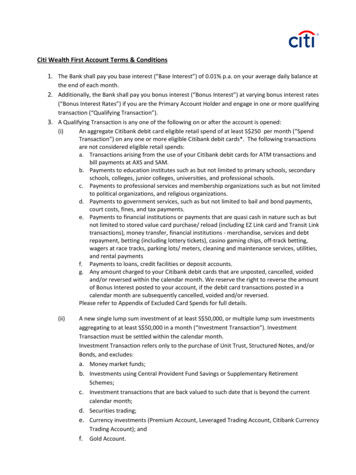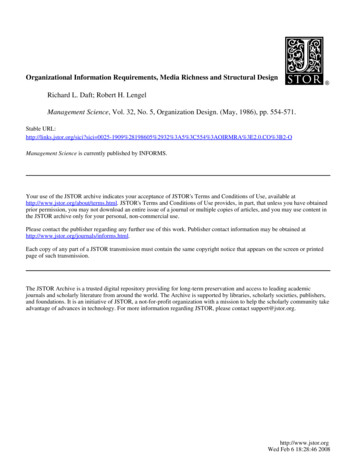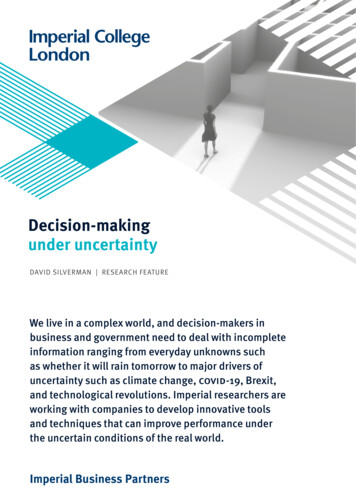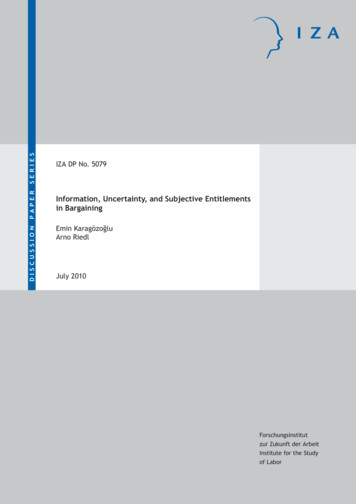
Transcription
SERIESPAPERDISCUSSIONIZA DP No. 5079Information, Uncertainty, and Subjective Entitlementsin BargainingEmin KaragözoğluArno RiedlJuly 2010Forschungsinstitutzur Zukunft der ArbeitInstitute for the Studyof Labor
Information, Uncertainty, andSubjective Entitlements in BargainingEmin KaragözoğluMaastricht UniversityArno RiedlMaastricht University,CESifo and IZADiscussion Paper No. 5079July 2010IZAP.O. Box 724053072 BonnGermanyPhone: 49-228-3894-0Fax: 49-228-3894-180E-mail: iza@iza.orgAny opinions expressed here are those of the author(s) and not those of IZA. Research published inthis series may include views on policy, but the institute itself takes no institutional policy positions.The Institute for the Study of Labor (IZA) in Bonn is a local and virtual international research centerand a place of communication between science, politics and business. IZA is an independent nonprofitorganization supported by Deutsche Post Foundation. The center is associated with the University ofBonn and offers a stimulating research environment through its international network, workshops andconferences, data service, project support, research visits and doctoral program. IZA engages in (i)original and internationally competitive research in all fields of labor economics, (ii) development ofpolicy concepts, and (iii) dissemination of research results and concepts to the interested public.IZA Discussion Papers often represent preliminary work and are circulated to encourage discussion.Citation of such a paper should account for its provisional character. A revised version may beavailable directly from the author.
IZA Discussion Paper No. 5079July 2010ABSTRACTInformation, Uncertainty, and Subjective Entitlements in Bargaining*More often than not production processes are the joint endeavor of people having differentabilities and productivities. Such production processes and the associated surplus productionare often not fully transparent in the sense that the relative contributions of involved agentsare blurred; either by lack of information about the actual performance of collaborators orbecause of random noise in the production process or both. These variables likely influencethe surplus sharing negotiations following the production. By means of a laboratoryexperiment, we systematically investigate their role for the whole bargaining process fromopening offers to (dis)agreements and find that uncertainties in surplus production and (even)a very coarse performance information lead to bargaining asymmetries. In addition, we findthat bargainers’ subjective entitlements are also influenced by performance information andthe randomness inherent in the production process. These differences in subjectiveentitlements together with the differences in entitlements between better and worseperformers influence the whole bargaining process and significantly contribute to thedifferences in bargaining outcomes.JEL Classification:Keywords:C790, C920, D010, D290, D630, D890, M590bargaining, performance information, randomness in production process,entitlements, experimentsCorresponding author:Arno RiedlMaastricht UniversityDepartment of EconomicsP.O. Box 6166200 MD, MaastrichtThe NetherlandsE-mail: a.riedl@maastrichtuniversity.nl*We would like to thank Gary Bolton, Elena Cettolin, Simon Gächter, Sebastian Kranz, Dan Levin,Ronald Peeters, Philipp Reiss, Ernesto Reuben, Alvin Roth, Daniel Seidmann, Chris Starmer, MartinStrobel, Alexander Vostroknutov, Christian Zehnder, Ping Zhang, and conference and seminarparticipants in Antwerp, Copenhagen, East Anglia, Harvard, Koç, Maastricht, Nice, Nottingham,PennState, and Rotterdam. Parts of this research were completed while the first author was visitingthe Center for Decision Research and Experimental Economics at the Nottingham School ofEconomics, Sabancı University, and Harvard Business School. We would like to thank the hostinstitutions for their hospitality. Research funding by the Oesterreichische Nationalbank through herAnniversary Fund (project no. 11780) is very much appreciated. All remaining errors are ours.
1IntroductionIn the season of 1998–1999, a players’ strike lasting 191 days shook the National Basketball League(NBA). Due to the strike the players lost in total about USD 500 million of income, the owners lostabout USD 1 Billion and the NBA lost billions of dollars because of dropped ratings. Ironically,the strike set in at a time when the NBA was experiencing very high ratings and generating largerevenues from broadcast and advertisement agreements (Donovan 1998). One important reason forthe strike was that the players thought that “the league has had enormous growth, globally even”and “players just want their fair share” (Donovan 1998), whereas the team owners argued thatthey are already paying too much to the players.1 A major disagreement underlying this disputeconcerned the question of the relative contributions of players and team owners to the success ofthe NBA. In a completely different business area, a similar conflict was reported between the voiceactor of a popular computer game and the company owning the rights of the game. The involvedparties strongly disagreed on their relative contribution to the sales success of the game, and inconsequence, on the relative fair share of the gains they felt entitled to (Schiesel 2008).2Disagreements about how to share a jointly produced surplus do not only occur in cases ofunexpected success but also, and probably more fiercely, in situations of economic distress. Discussions and disputes about how to share the burden between white collar and blue collar workers orbetween management and workers during business and economic crises come to mind (Corfman andShmeltzer 2002; Buhayar 2009; Lyons 2009). A recent example is the economic crisis in Greece: onFebruary 10, 2010, thousands of people hit the streets of Athens to protest the Greek government’sbelt-tightening program amid a deep economic crisis. Their message was that the crisis is mainlydue to the wrong-doings of the high-level managers and corrupt business practices in the financialsector and hence the burden should be put on them, not on the low-income, blue-collar workers.Also in the (semi-)public sphere discussions about how to share the fruits of success and the burdenof distress are frequent. In academic institutions financial distress leads to less liquidity and, hence,necessary cuts in departments’ budgets. In such situations, while most agree on the necessity ofcuts, there is much disagreement about the distribution of the burden and how it is going to bedetermined (Jan 2009). Another example are arising discussions and conflicts when it comes to1The cited statements are taken from the speech of Atlanta Hawks forward and member of the union’s executivecommittee, Tyrone Corbin.2The computer game Grand Theft Auto IV became the fastest selling game to date when it was released onDecember 2, 2008 in the United States. It sold about 3.7 million copies on its first day, generating at least USD 500million revenue in the first week (Ortutay 2008; Totilo 2008). The voice actor (Michael Hollick) and the company(Rockstar Games) haggled about the relative contributions of the “human performance” and the “conception of theart director” to the success of the game.1
reforms of public pensions or health insurance systems, where the conflict often centers around thequestion of the relative burden different generations and different income groups have to carry.How different these examples are, they are all related to the fact that economic surplus is thejoint product of different people whose interests diverge when it comes to the division of the jointlycreated surplus. Agreements on how to divide the surplus may seem easy if it is without doubtdetermined by the contributions of all involved parties and when there is complete informationof the relative contributions. However, often, if not most of the time, the relative contributionsof the involved parties cannot be precisely determined and success and failure is at least partlydetermined by random factors inherent to the production process. The (lack of) information andthe (un)certainties in the production process may lead to disagreements among the parties and,hence, may influence the outcomes of negotiations on how to share the produced surplus. Inaddition, there is evidence that such negotiations can be influenced by entitlements and obligationsparties bring to the bargaining table (Thompson and Loewenstein 1992; Babcock et al. 1996;Gächter and Riedl 2005).Interestingly, there is no clean evidence on how relative performance information and information about the influence of exogenous factors in surplus creation affects bargaining outcomes. Suchevidence is important, however, because a good understanding of the influences of these factorson bargaining behavior may help to avoid discussions and potentially costly conflicts as reportedabove. In addition, in the reported examples the involved parties often explicitly or implicitly referto their (perceived) entitlements when arguing in their own favor. For instance, in the NBA conflictplayers claimed that they only wanted their fair share and in political discussions around pensionreforms it is often the older generation which argues that they have contributed to the increase inwealth and are, hence, now entitled to their fair share. In view of this, it is surprising that littleis known about the interaction between information on relative contributions and uncertainties insurplus creation and entitlements in bargaining.In this paper we implement a 2 2 experimental design to investigate the effects of relativeperformance information and random noise in the production process on bargaining behavior, andto explore how these factors interact with subjective entitlements.3 Specifically, in one condition thesurplus is produced by the performance of two subjects in a real effort task in a deterministic way,whereas in another condition the surplus size is also influenced by a random factor. To investigatethe effect of relative performance information, in one condition we inform subjects in a bargaining3In the literature, the term “entitlement” is not always used in the same way. In our study we use the term asdefined by Schlicht (1998, p.24): “Entitlements are rights, as perceived by the individual. They are not, however, abstract legal rights. Rather they denote the subjectively perceived rights that go along with a motivational dispositionto defend them.”2
pair whether (s)he has been the better or worse performer, whereas such information is not given inanother condition. In addition, in all conditions we elicit subjects’ subjective entitlements by wayof a fairness question as in Gächter and Riedl (2005). After production subjects have to bargainon the distribution of the surplus in a computerized free-form bargaining environment, where wecan trace all important elements of the negotiation process from opening proposals, concessionbehavior, bargaining duration, and (dis)agreements.We find that information about the relative performance as well as (the absence of) noisein the surplus production affect bargaining behavior at all levels. Compared to the situationwithout performance information, in the condition with performance information opening proposalsand agreements are skewed away from an equal split in favor of the party that performed betterin the real effort task. In addition, relative performance information leads to smaller and laterconcessions and longer bargaining duration. Furthermore, in comparison to surplus productionwith noise, opening proposals favor the better performing party, concessions are smaller and later,and bargaining duration is longer, when the surplus creation is deterministic.Subjective entitlements play an important role in explaining differences in bargaining outcomeswithin as well as between conditions. First, probably unsurprisingly, entitlements of better andworse performers differ and they differ most in the condition with relative performance information.Second, and more importantly, we can trace the differential influence of entitlements among thedifferent conditions through the whole bargaining process. In all conditions, opening proposals ofbetter performers are significantly positively influenced by their entitlements. This does not hold forworse performers. Concession behavior and bargaining duration are strongly related to the tensionin entitlements between better and worse performers, but only in conditions with performanceinformation and deterministic surplus production. In consequence, in these conditions, bargainingdurations are also influenced by entitlements. When the production process is deterministic alsoagreements are strongly influenced by entitlements of the better performing subject, but not bythe worse performing subject. In summary, we find that the knowledge of relative performancesin the real effort task as well as the randomness of the production process differentially influencebargaining behavior, and that much of this differences are mediated by subjective entitlementsbargainers derive in the production process.The rest of the paper is organized as follows. The next section provides a brief overview of therelated literature. Section 3 presents the experimental design and procedures, Section 4 reports theresults and Section 5 concludes.3
2Related LiteratureThere are only a handful of papers, which examine the influence of fairness judgments (or subjectiveentitlements) on negotiations. Messick and Sentis (1979) report results from an experiment showingthat subjects’ fairness judgments are self-servingly biased. Thompson and Loewenstein (1992) alsofind that subjects’ fairness interpretations are egocentric and that these biases cause delays insettlement and that the magnitude of these biases predicts the length of delays in agreements.Along the same lines, Babcock and Loewenstein (1997) show that self-servingly biased assessmentsof fairness can delay agreements and cause impasse even when the fairness assessments are commonknowledge or impartial. More recently, Gächter and Riedl (2005) find strong entitlement effectsthat shape all layers of the negotiation process and they argue that entitlements constitute a “moralproperty right” that is influential independent of negotiators’ legal property rights.Standard bargaining theory predicts that more information leads to more efficient bargainingby reducing information asymmetries between bargaining parties and, hence, strategic delays (Rubinstein 1985; Admati and Perry 1987). However, Camerer and Loewenstein (1993) show thatincreasing the information available to bargainers may lead to less efficient bargaining. The mainreason for this is that the information provided to bargainers may strengthen the tension betweentheir fairness judgments and this effect may offset the positive effect information is supposed tohave.4 Babcock, Loewenstein, Issacharoff and, Camerer (1995) and Loewenstein and Moore (2004)are other studies, which also showed that sharing information may lead diverging perceptions offairness and, hence, make settlements less likely.To the best of our knowledge, there is no study that examines the influence of noise in thesurplus production process on the bargaining of how to share the produced surplus. Diekmann etal. (2004) argue that when people face increased uncertainty, fairness becomes more important tothem and fairness judgments affect their reactions more strongly. However, their study investigatesthe influence of uncertainty about performance standards and appropriate behaviors on the relationship between fairness and job satisfaction. Babcock, Loewenstein and Wang (1995) study theeffect of uncertainty about the bargaining opponent’s reservation value and show that uncertainty4When motivating their argument they present the following interesting example about the potentially negativeinfluence of information on bargaining outcomes: “For example, suppose two people contribute different amounts oftime to a joint project. The person who worked less will typically think that equal compensation is fair, while theperson who worked more will think that payments should be proportional to effort (Messick and Sentis 1983). If theparties bargain over how to split the proceeds from the project and each know how much the other worked, they mayhave difficulty in agreeing up on a split, since the one who worked more will demand a larger share of the proceedswhile the one who worked less will demand an equal share. If the parties did not know how much the other put in,however, they could not base compensation on input levels and they might be more likely to settle.”4
decreases bargaining efficiency. A related literature concerns people’s tendency to overestimatetheir own inputs (see Ross and Sicoly 1979) and that the interpretation of “deservingness” is often controversial (see Bazerman and Neale 1992). Both of these effects may be intensified underuncertainty.3Experimental SetupIn our experiment, randomly and anonymously paired subjects take on the role of department headsof a company who have to bargain over a salary budget. This salary budget is either completely oronly to some extent determined by the department heads’ joint performance in a real effort task.In addition, we vary the information about the relative performance of the department heads.Specifically, in the noinfo condition subjects receive no information on their relative or absoluteperformances in the real effort task, whereas in the info condition subjects get informed who in apair had the better and who had the worse performance. In the deterministic (det) condition thesalary budget is completely determined by department heads’ joint performance, whereas in thestochastic (stoc) condition the salary budget is determined by department heads’ joint performanceonly with a 25% chance and randomly determined with a chance of 75%. Hence, we have a 2 2experimental design with four treatments, which are labeled as noinfo-stoc, noinfo-det, info-stocand, info-det.At the beginning of the experiment, subjects are informed that their firm has a salary budgetof 2050 points available and that this budget can change depending on their performances or somefactors external to the firm. In any event, the top management of the firm does not want to imposea salary distribution. Instead, the department heads are asked to bargain over the distribution ofthe salary budget.5 In the experiment 100 points are worth 65 euro cents. Hence, the default salarybudget of 2050 points corresponds to e 13, 33.Table 1 summarizes the main elements of the experiment in the sequence they were presentedto the subjects.6 Below, we explain each part in detail.Performance and Outcome Determination: After reading the instructions aloud, the performance of each department head is determined with a general knowledge quiz (Hoffman et al.1994; Clark 1998; Gächter and Riedl 2005). Before taking the quiz subjects are informed that theirperformances will affect the salary budget either for sure (in det) or with some chance (in stoc).5This framing and some other details of the experimental design are borrowed from Gächter and Riedl (2005).6After stage 7 we conducted another bargaining round, which was not pre-announced. The results of this stageare reported elsewhere.5
Table 1: Sequence of Events1.Reading of instructions2.Performance determination3.Outcome determination4.Elicitation of beliefs on performances5.Relative performance information†6.Measurement of entitlements7.Bargaining8.De-briefing questionnaire† Thisinformation is given only in info conditionThe general knowledge quiz consists of 16 multiple choice questions. For each question fivepossible answers are provided, with exactly one being the correct answer. The questions concernseveral fields of knowledge, such as politics, music, religion, astronomy and, geography. Eachparticipant receives the same set of questions in the same order. Subjects have at most 30 secondsto answer each question. Unanswered questions count as wrong answers. The head of departmentwith the most correct answers in each pair has a better performance. All subjects are informed ofthese details.After the quiz, subjects get to know the actual salary budget, which could be 1390, 2050, or 2710points. In the det condition, the salary budget is determined completely by the joint performancesof department heads in a pair and described to subjects in the following way:(i) If the total number of correct answers by you and the other department head is from 0 to 10,then the salary budget will be 1390 points.(ii) If the total number of correct answers by you and the other department head is from 11 to 20,then the salary budget will be 2050 points.(iii) If the total number of correct answers by you and the other department head is from 21 to 32,then the salary budget will be 2710 points.In the stoc condition, subjects are informed that with a chance of 25%, their salary budget isdetermined by their joint performances and with a chance of 75% randomly, in which case eachsalary budget size has an equal chance to be chosen.Elicitation of Beliefs on Performances: Knowing the salary budget, each subject is askedto report his or her beliefs about the own number of correct answers as well as the number ofcorrect answers of the other department head. The rationale for asking subjects’ beliefs about their6
performances after informing them about the value of the salary budget is that attributions maybe reflected by these beliefs. These belief elicitations are incentivized: for each precise estimation,a subject earns 60 points, for each estimation with 1 (2) error(s), a subject earns 30 (15) points;estimates with larger errors do not earn any points.Relative Performance Information: In the noinfo condition, subjects are not given any information about their relative performances in the quiz. In the info condition, they are giveninformation indicating whether they are the better or worse performer in their pair.7 Specifically,the department head with more (less) correct answers in each pair receives a message saying that“You had more (less) correct answers in the general knowledge quiz than the other departmenthead”. In case of ties, subjects are also informed about that.Measurement of Subjective Entitlements: We measure subjective entitlements of bargainersby an arbitrator question, adapted from Babcock, Loewenstein, Issacharoff and, Camerer (1995).All subjects answer the following question:8“According to your opinion, what would be a ‘fair’ distribution of the salary budget from thevantage point of a non-involved neutral arbitrator ? (Please use exact amounts; no intervals! Theamounts have to sum up to the salary budget!)”The answer given to this question informs us about subjective fairness judgments that are likelyto influence bargaining behavior (cf. Gächter and Riedl 2005).Bargaining: Subjects in each pair have to bargain over the available salary budget. Bargaining cantake at most ten minutes and if subjects reach an agreement, they are paid their agreed shares. Ifthey do not reach an agreement within ten minutes, they are ‘fired’ by the top management and donot earn any points from bargaining. Bargaining is free-form because it avoids exogenous first-movereffects and gives subjects as much bargaining freedom as possible (e.g., in the timing, sequence andnumber of proposals). Subjects are seated in computer cubicles and bargain anonymously over acomputer network by sending proposals that consist of an amount for themselves and an amountfor the other department head. Verbal communication is not allowed.97The rationale for presenting this information after eliciting beliefs on performances is two-fold. First, the salarybudget information already reduces performance uncertainty and we did not want to present more information thatmight influence subjects’ beliefs, and second, we did want to have a certain level of symmetry in belief elicitationbetween the info and noinfo conditions.8Subjects were not informed about this question beforehand. They answered it after they stated their beliefsabout performances in the noinfo condition and after they received the relative performance information in the infocondition, respectively. Hence, subjects’ fairness judgments may depend on the role (they believe) they are in. Forthis reason, we call this entitlements subjective.9For bargaining instructions and a bargaining screen-shot, see the Appendix B.7
De-briefing Questionnaire: After all parts of the experiment are finished, subjects are askedto report their satisfaction about the bargaining outcome, their opinion about the quiz and theirbargaining behavior. They are also presented the Machiavelli personality test (Christie and Geis1970) to measure certain personality traits such as toughness, self-orientation, competitiveness,etc., which could be important in bargaining, and a risk attitude questionnaire (Dohmen et al.2005). Finally, subjects answer a few questions about their personal background.The experiment was computerized and programmed in z-Tree (Fischbacher 2007). We conducted the experiment in the BEElab (Behavioral and Experimental Economics laboratory) ofMaastricht University in April 2009 and February 2010. In total 348 subjects participated in 16randomized experimental sessions. Most of our subjects were undergraduates in economics, business and international business. A typical session lasted about 90 minutes. The average earningsper subject were approximately e 16 (including a show-up fee of e 3).4ResultsWe first present some descriptive statistics using the pooled data from all conditions and thenmove on to a more detailed analysis of important aspects of the bargaining process (that is, openingproposals, concessions, bargaining duration, agreements). In the analysis of the different conditionswe focus on differences between the info and the noinfo conditions (aggregating over det and stoc)and the det and the stoc conditions (aggregating over info and noinfo). The reason for this focusis that it allows us to examine, on the one hand, the effect of performance information, and, onthe other hand, the effect of uncertainty in the budget determination process. Thereafter, werelate differences in the bargaining process across different conditions to differential influences ofsubjective entitlements.In what follows, we refer to the subject with more (less) correct answers in the general knowledgequiz as the “winner” (“loser”) and express all allocations in shares to the winners (“winner share”).Throughout the paper, when referring to statistical tests, we use two-sided Mann-Whitney signedrank, Wilcoxon rank-sum, and Spearman rank-order correlation tests where appropriate and unlessotherwise stated.Overall, in 22 (out of 174) pairs both subjects had the same number of correct answers. Onaverage, the fairness judgment of these subjects is 0.53. 19 of these pairs agreed on an equaldivision of the salary budget. Whenever we analyze winners’ and losers’ behavior (e.g., theirfairness judgments, opening proposals etc.) we exclude these pairs from the analyzes. Furthermore,in regression analyzes where we use pair-level data (e.g., bargaining duration, concession behavior8
etc.) these pairs are included and their impact is controlled for with a dummy variable, tie. It takesthe value 1 for pairs where both subjects had the same number of correct answers, and 0 otherwise.4.1Descriptive StatisticsThe average number of correct answers in the quiz was 7 (out of 16). On average, subjects predictedthat they had 7.26 correct answers and that the other department head had 7.54 correct answers(p 0.015). That we do not observe overconfidence is in line with findings in other studiesindicating that there is no (or negligible) overconfidence at success levels of around 50% (cf. Mooreand Healy 2008; Blavatskyy 2009). Importantly, subjects’ answers to the de-briefing questionsabout the quiz show that they perceive it as a legitimate measure of general knowledge, which isalso confirmed by subjects’ opinion on the difficulty of the quiz.10The salary budget of 1390, 2050, and 2710 points occurred in 55, 81, and, 38 pairs, respectively.In the statistical analysis we pool all salary budget sizes because there are no significant differenceswith regard to any main behavioral aspects, as fairness judgments, bargaining duration, agreements,etc., across different budget sizes.11 Overall, the average duration of bargaining was 5.48 minutesand the average number of proposals in a pair was 11.6. Out of 174 bargaining pairs, 169 reachedan agreement, with an average winner share (of the salary budget) of 0.53. We exclude the fivepairs which did not reach an agreement from our analyzes of agreement times and agreements.4.2The Effects of Information and (Un)certainty on Bargaining OutcomesOpening Proposals: Figure 1 depicts the distribution of the very first proposals (opening proposals)made in a bargaining pair, separately for losers and winners in the pooled data. As the figureshows, winners’ opening proposals are always at or to the right of 0.50 (mean 0.63) and losers’opening proposals are mostly at or to the left of 0.50 (mean 0.45). The equal-split (50-50) is themodal opening proposal of losers, who made an opening proposal in 26 out of 73 cases.The share proposed in the very first offer clearly depends on the role the subject is in. In allfour conditions, the opening proposals of winners are highly significantly larger than the openingproposals of losers (p 0.0001). In addition, 11 (1) of 12 equal-split proposals in info came10In a 7-point Likert scale where “1 do not agree at all” and “7 agree very much”, the average (median) degreeof
a very coarse performance information lead to bargaining asymmetries. In addition, we find that bargainers' subjective entitlements are also influenced by performance information and the randomness inherent in the production process. These differences in subjective entitlements together with the differences in entitlements between better and .
